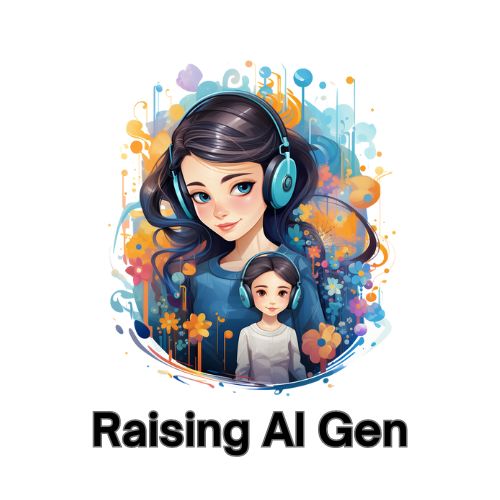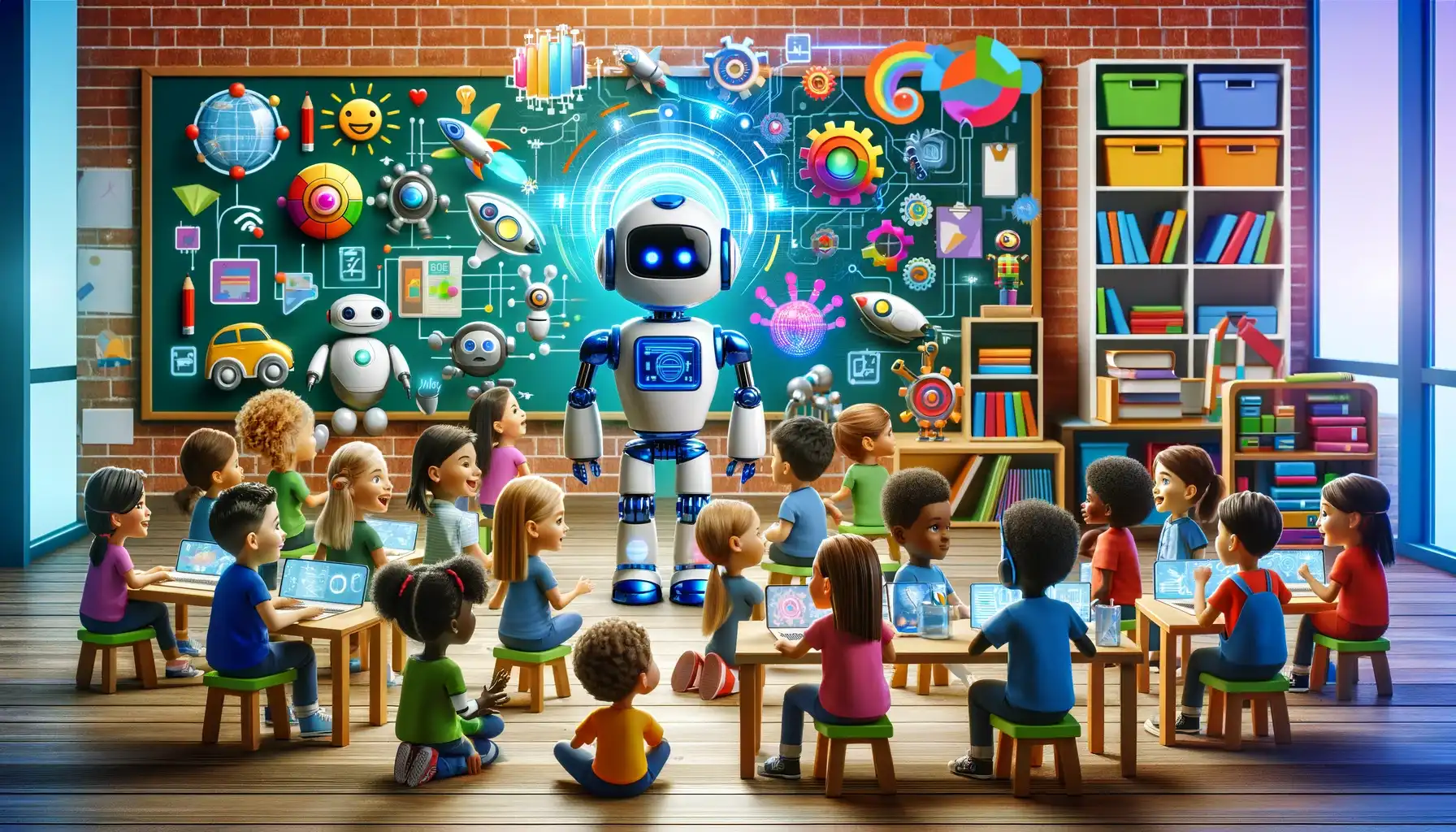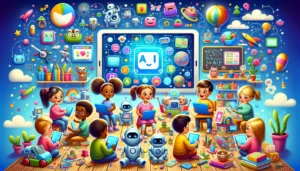In today’s digital era, AI Cognitive Skills for Kids have become a cornerstone in the evolving landscape of education and development. As we usher in a new age of learning, artificial intelligence stands at the forefront, offering unparalleled opportunities for enhancing cognitive skills in children. From interactive learning tools to personalized educational experiences, AI is reshaping how kids learn, think, and interact with the world around them.
The integration of AI into children’s learning journeys is not just about staying abreast with technology; it’s about nurturing a generation of problem solvers, critical thinkers, and creative minds. With AI’s tailored learning methodologies, children are not only learning faster but also developing essential skills that prepare them for a future where AI is ubiquitous.
Key Takeaways
- Personalized Learning: AI tools adapt to individual learning styles, ensuring a tailored educational experience for each child.
- Enhancing Creativity: AI fosters creative thinking by providing interactive and captivating resources.
- Developing Problem-Solving Skills: Through AI applications, children learn to tackle challenges and think independently.
- Building Social Skills: AI can aid in the development of essential social skills, preparing kids for collaborative and communicative futures.
- Future-Ready Skills: Exposure to AI prepares children for a technologically advanced world, equipping them with future-ready skills.
Explore how AI is revolutionizing childhood learning and cognitive development, and how it’s becoming an indispensable part of educational growth. Discover more about AI in early childhood education to understand the profound impact AI has on young minds.
Understanding AI and Cognitive Development in Kids
In this rapidly evolving digital world, understanding the intersection of AI and cognitive development in children is crucial. AI is not just a technological novelty; it’s a tool that can significantly enhance learning and cognitive growth in kids.
Let’s delve into how AI contributes to this crucial developmental phase.
The Essence of Cognitive Development
Cognitive development refers to the progression of learning and thinking skills in children. This includes abilities like memory, problem-solving, and decision-making.
AI tools are designed to nurture these skills, making the learning process both effective and engaging.
- Memory Enhancement: AI-powered educational games and apps help in improving memory retention.
- Decision-Making Skills: Interactive AI scenarios enable kids to make choices, enhancing their decision-making abilities.
- Problem-Solving: Through AI puzzles and challenges, children develop critical problem-solving skills.
AI’s Role in Optimizing Mental Development
AI’s impact on children’s mental development is profound. The child’s brain, a hub of curiosity and wonder, is ripe for the benefits that AI can bring.
Tools powered by AI offer diverse learning experiences that adapt to a child’s pace and style, making education not just personalized, but also effective.
- Adaptive Learning: AI systems adapt to a child’s learning pace, ensuring personalized educational experiences.
- Interactive Experiences: Through games and interactive modules, AI tools make learning fun and engaging.
- Focus on Curiosity: AI encourages exploration and curiosity, vital aspects of cognitive growth.
AI Tools for Cognitive Enhancement
There are numerous AI tools available that cater to enhancing cognitive skills in kids. Each tool offers a unique approach to learning, ensuring that there is something for every child’s interest and learning style.
- Osmo – Interactive Learning System: Osmo blends physical play with digital technology, offering games that develop math, spelling, and coding skills. It’s suitable for kids aged 4-12 years old.
- Cognimates – Machine Learning Platform: Developed by MIT Media Lab, this platform allows kids to engage in projects like creating chatbots or training image classifiers.
- Sphero Edu – Coding Robots: This app-controlled robotic ball teaches programming while encouraging creativity through hands-on STEAM activities.
- Brainly – Homework Help App: Powered by AI, this app helps students find answers across various subjects, fostering collaboration.
- Duolingo – Language Learning: Using AI, Duolingo offers personalized language lessons, making learning new languages fun for kids.
Popular AI Tools for Enhancing Cognitive Skills
In the realm of AI and childhood development, a variety of tools stand out for their ability to enhance cognitive skills in kids. These tools, ranging from interactive learning systems to creative problem-solving platforms, are revolutionizing the way children learn and develop essential skills.
Interactive Learning Systems
Interactive learning systems use AI to create engaging educational experiences that are both fun and informative. These systems often combine digital technology with physical elements, offering a hands-on approach to learning.
- Osmo – Learning Through Play: Osmo’s system is a blend of physical play and digital technology, targeting skills in math, spelling, and coding, perfect for kids aged 4-12 years.
- Duolingo – Language Skills: This popular app uses AI to tailor language lessons to each user’s progress, offering a dynamic way to learn new languages.
Machine Learning Platforms for Kids
Machine learning platforms are designed to introduce children to the concepts of AI and machine learning in an accessible and engaging way.
- Cognimates: Developed by MIT Media Lab, Cognimates allows kids to engage in projects like creating chatbots or training image classifiers, making complex concepts approachable.
- Code.org: An excellent resource for introducing computer programming, Code.org uses engaging activities to teach coding and develop problem-solving skills.
AI-Powered Educational Apps
Educational apps powered by AI provide personalized learning experiences, adapting to the child’s pace and style. These apps cover a wide range of subjects and skills.
- Brainly – Collaborative Learning: Brainly leverages AI to help students find solutions to homework problems across various subjects, promoting collaborative learning.
- Socratic by Google: Using speech recognition and machine learning, Socratic offers instant explanations on a range of topics, encouraging self-learning and problem-solving.
The Benefits of AI Tools in Learning
These AI tools offer a host of benefits, from personalized learning experiences to the development of critical thinking and problem-solving skills. Here’s a quick overview:
- Personalization: AI adapts to each child’s learning style and pace.
- Engagement: Interactive and fun, these tools keep children interested in learning.
- Skill Development: From coding to language skills, AI tools offer a range of learning opportunities.
- Accessibility: Many of these tools are accessible from home, providing learning opportunities outside of traditional classroom settings.
Encouraging Creative Thinking with AI
Nurturing creativity in children is crucial, and AI tools play a significant role in this endeavor. These tools offer unique and interactive ways to stimulate the inventive minds of young learners, allowing them to explore their creative potential.
Storytelling and Artistic Expression
AI offers novel ways for children to express themselves creatively, be it through storytelling or artistic endeavors.
- Once Upon A Bot – AI Storytelling: This tool uses machine learning to create stories based on a child’s interests, enhancing their creative storytelling abilities.
- Picsart – AI for Artistic Exploration: With AI-assisted features, Picsart allows children to transform sketches into digital art, fostering artistic creativity without the need for prior experience.
Music Creation with AI
Music creation is another area where AI has made significant strides, offering children a platform to experiment with and understand music in new and exciting ways.
- AIVA – AI Music Composition: AIVA is an advanced platform that uses AI to compose original music, allowing children to explore different genres and instruments.
AI’s Impact on Creativity
The impact of AI on fostering creativity in children cannot be overstated. It provides them with tools that are:
- Interactive: AI tools are engaging and responsive, keeping children interested and motivated.
- Innovative: These tools offer new ways of creative expression, pushing the boundaries of traditional methods.
- Educational: While being fun, they also impart valuable skills and knowledge.
Teaching Problem-Solving Skills with AI
Equipping children with problem-solving skills is essential in today’s fast-paced world, and AI tools play a pivotal role in this. These tools provide interactive and innovative ways to challenge young minds, encouraging them to think critically and solve problems creatively.
AI for Enhancing Problem-Solving Abilities
AI-driven platforms offer various approaches to developing problem-solving skills in children, from coding challenges to interactive puzzles.
- Blockly Games – Learning Through Coding: Blockly Games introduces programming concepts in a fun, visual way, helping children develop logical thinking and problem-solving skills.
- Socratic by Google – Exploring Knowledge: This app uses AI to provide explanations on diverse topics, fostering independent problem-solving and research skills.
How AI Tools Foster Problem-Solving
AI tools specifically designed for problem-solving offer several benefits:
- Interactive Learning: They provide an engaging environment where children can interact with problems in a hands-on manner.
- Incremental Challenges: These tools often present problems in a progressive manner, gradually increasing in complexity.
- Real-Time Feedback: AI algorithms provide immediate feedback, helping kids understand and learn from their mistakes.
Developing Social Skills with AI
In the digital age, AI’s influence extends beyond academic learning; it also plays a crucial role in developing social skills in children.
AI tools designed for social skill enhancement help kids learn effective communication, understand emotions, and collaborate with others.
Virtual Interaction and Emotional Intelligence
AI provides unique platforms for children to interact socially and understand emotional cues, which are essential for developing empathy and communication skills.
Virtual Playmates and Emotion Recognition
- Temi the Robot – Interactive Companion: Temi acts as a virtual playmate, encouraging kids to communicate and express themselves, adapting to their interests and preferences.
- Affectiva – Understanding Emotions: This AI-powered app helps children recognize and understand different emotions by analyzing facial expressions, a key aspect of social interaction.
AI in Collaborative Learning Environments
AI-driven platforms can also foster teamwork and collaborative skills among children, an essential aspect of social development.
Enhancing Teamwork and Communication
- Brainly – Cooperative Learning: Brainly creates a digital space where students worldwide collaborate to solve problems, enhancing communication and teamwork abilities.
- Collaborative AI Games: Games that require teamwork and communication help children learn the importance of working together to achieve common goals.
The Broader Impact of AI on Social Development
AI’s role in social skills development is multifaceted, offering opportunities for children to engage in meaningful social interactions in a controlled and safe environment.
These tools are:
- Engaging: AI makes learning social skills fun and interactive.
- Adaptive: They can adapt to the individual needs of each child.
- Safe: AI provides a controlled environment for children to practice social interactions.
Enhancing Learning Experiences with AI
Artificial Intelligence is not just transforming industries; it’s revolutionizing the way children learn.
AI in education provides a dynamic, engaging, and personalized learning experience, catering to the individual needs and abilities of each child.
Personalized Learning Paths
One of the most significant advantages of AI in education is its ability to create personalized learning experiences for children.
Tailoring Education to Individual Needs
- Adaptive Learning Technologies: AI systems analyze a child’s learning style and pace, adjusting the curriculum to suit their unique needs.
- Feedback Systems: AI-powered feedback systems provide real-time responses to students’ inputs, helping them understand concepts better and at their own pace.
Gamification in Learning
Gamifying education is another effective strategy where AI plays a crucial role, making learning more enjoyable and engaging.
Making Learning Fun and Interactive
- Points and Badges: Incorporating elements like points and badges in educational content keeps children motivated.
- Interactive Challenges: Games that require problem-solving and strategic thinking enhance learning and retention.
Virtual Tutors and Assistants
AI-driven virtual tutors and assistants are becoming increasingly prevalent, offering additional support to students outside traditional classroom settings.
On-Demand Learning Support
- 24/7 Assistance: Virtual AI tutors provide help anytime, ensuring that children have access to educational support whenever needed.
- Personalized Guidance: These digital assistants can tailor their teaching methods to suit the learning preferences of each student.
Embracing the AI Revolution in Childhood Education
As we reach the conclusion of our exploration into AI tools for enhancing cognitive skills in kids, it’s clear that the landscape of education is undergoing a monumental shift.
AI is not just a technological trend; it’s a transformative force that’s reshaping the way children learn, think, and interact with the world.
The Transformative Power of AI in Education
The journey through various AI tools and platforms highlights their significant impact on childhood learning:
- Personalized Learning Experiences: AI adapts to individual learning styles, making education more effective and enjoyable.
- Fostering Creativity and Problem-Solving: AI tools stimulate creative thinking and enhance problem-solving skills, preparing children for future challenges.
- Developing Social and Emotional Skills: Through interactive and engaging platforms, AI aids in the development of essential social and emotional competencies.
- Accessible and Inclusive Education: AI makes learning more accessible, catering to a diverse range of needs and abilities.
Stepping into the Future of Learning
As parents, educators, or anyone invested in the future of our children, the time to act is now. Embracing AI in education opens doors to a world of possibilities for our young learners. Here’s how you can be a part of this exciting journey:
- Explore AI Tools: Dive into the world of AI by exploring tools like Osmo and Brainly to find the right fit for your child’s learning style and interests.
- Stay Informed: Keep abreast of the latest developments in AI and education. Websites like AI in early childhood education are great resources.
- Encourage Experimentation: Allow children to experiment with different AI tools and platforms, fostering a love for learning and exploration.
- Support and Guide: Be there to support and guide children as they navigate this new digital learning landscape.
AI in education is not just about preparing children for a future dominated by technology; it’s about empowering them with the skills, knowledge, and creativity to thrive in any future they choose.
Let’s embrace this AI revolution and unlock the limitless potential of our young learners.
FAQ
| Frequently Asked Questions (FAQs) | Answers |
|---|---|
| What are AI tools in education? | AI tools in education refer to applications and platforms that use artificial intelligence to enhance learning experiences. These tools offer personalized, interactive, and adaptive learning methods. |
| How do AI tools help in children’s cognitive development? | AI tools aid in cognitive development by providing personalized learning experiences, enhancing problem-solving skills, fostering creativity, and improving memory and decision-making abilities. |
| Can AI tools replace traditional learning methods? | While AI tools are transformative, they are not meant to replace traditional learning methods but rather complement them, offering a blended approach that maximizes learning effectiveness. |
| Are AI educational tools suitable for all ages? | Yes, most AI educational tools are designed to cater to a range of age groups, with content and complexity tailored to different developmental stages. |
| How can parents and educators integrate AI tools into learning? | Parents and educators can integrate AI tools by incorporating them into existing curricula, encouraging exploratory learning, and using these tools to supplement traditional teaching methods. |
| What are some popular AI tools for kids? | Popular AI tools for kids include Osmo for interactive learning, Brainly for collaborative problem-solving, and Duolingo for language learning. There are also platforms like Blockly Games for coding and Socratic by Google for homework help. |
| Is there a risk of children becoming too dependent on AI for learning? | There is a potential risk of over-reliance on AI tools, which can be mitigated by balancing AI-assisted learning with traditional methods and ensuring that children also develop independent learning skills. |
| How can AI tools ensure a safe learning environment for kids? | AI tools ensure a safe learning environment by providing age-appropriate content, secure online platforms, and often include parental controls to monitor and guide children’s use of the technology. |





